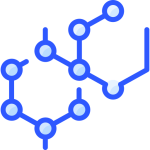Are you trying to naturally increase your testosterone levels? You’re not alone! A key hormone that is essential to sustaining your general health and wellbeing is testosterone. Unfortunately, age, nutrition, and lifestyle choices may all have an impact on testosterone levels, which can result in a variety of unfavorable symptoms.
Fortunately, you may employ a number of natural techniques to help raise your testosterone levels and enhance your quality of life. We'll look at four practical methods that may help you increase your testosterone levels and feel your best, from dietary modifications to adding certain activities to your program. So let's get started and see how these simple suggestions may help you improve your health in the long-run.
What Is Testosterone?
Before we dive into the four tips to help increase your testosterone naturally, let’s quickly go over what testosterone is. Despite being present in both sexes, testosterone is a hormone that is largely generated in the testicles and ovaries of men and females, respectively.
It is essential for the growth of new muscle tissue, the preservation of bone density, and the control of sexual desire, among other things as well. Low testosterone levels may result in a variety of symptoms, including less energy, diminished sex desire, and increased body fat.
Testosterone levels tend to drop with age, and low levels can result in these problems or sometimes even worse. Individuals who have a better understanding of what testosterone is and how it works inside the body are better able to take actions to increase their levels of the hormone and, as a result, their general health and wellbeing. All that being said, let’s now go over the top four tips to naturally boost your testosterone.
#1 Exercise Regularly
Regular exercise is one of the most effective natural methods to enhance testosterone levels, and it is also one of the most enjoyable ones. The synthesis of testosterone and other growth hormones in your body may be enhanced along by participating in some kind of physical exercise at least twice each week.
In particular, research has shown that resistance training, such as weightlifting, is particularly helpful in increasing levels of testosterone. This is due to the fact that it encourages the body to produce more testosterone, which, among other advantages, promotes increased muscular development. In addition, high-intensity interval training, more often known as HIIT, is an excellent method for increasing testosterone levels. You may increase your general health and wellbeing as well as your testosterone levels if you make regular exercise a part of your routine and stick to an exercise plan.
#2 Get a Good Amount of Rest
It should come as no surprise that a lack of sleep may negatively affect testosterone levels; sleep is vital for general health and wellness. Numerous studies have shown that having an adequate amount of quality sleep is very important for maintaining healthy testosterone levels. According to the findings of one research, the levels of testosterone in males who slept for fewer than five hours per night compared to those who slept for seven to eight hours per night showed a significant difference.
#3 Eat a Diet That Is Good for Your Body
It is very important to eat a diet that is both nutritious and well-balanced in order to maintain healthy levels of testosterone. It has been shown that foods that are rich in zinc, healthy fats, and protein are especially helpful in increasing testosterone levels in the body. The following are some examples of foods that are rich in the respective nutrients:
- Lean meats like chicken and turkey,
- A variety of nuts and seeds, including pumpkin seeds and almonds,
- Avocado with olive oil,
- Greens with a dark, leafy appearance, like spinach and kale,
- Shellfish, including oysters and various varieties,
- Among others…
Since eating processed meals and sweets that have been refined may have a detrimental effect on testosterone levels, it is essential to keep your consumption of these items to a minimum and try to add healthier options into your diet instead.

#4 Manage Your Stress
Last but not least, try to manage your stress levels. The levels of testosterone in the body might be negatively impacted by prolonged exposure to stress. Cortisol is a hormone that is secreted by the body in response to stress. This hormone has the potential to inhibit testosterone synthesis. Try adding activities that lower stress into your daily routine, such as yoga, meditation, or deep breathing techniques, so that you may feel less stressed throughout the day. In addition to this, make sure that you are receiving adequate rest and that you are making time for activities that bring you pleasure.
Bonus Tip: Consider Participating in a Testosterone Replacement Therapy Program
If you have already used these natural treatments but are still unable to raise your testosterone levels, testosterone replacement therapy, often known as TRT, could be something you want to consider. The treatment of low levels of natural testosterone in the body with TRT entails administering synthetic testosterone to the patient. It is possible to deliver it by a number of different methods, such as injections, gels, and patches.
TRT is something that should only be used under the supervision of a trained medical practitioner such as our medical team. They are able to assess your unique circumstance and provide guidance on the treatment that would be most beneficial to you.
How Important Is Testosterone for the Body?
It is very important for one’s well-being and general health to keep their testosterone levels in a healthy range. Although there are a lot of natural methods to boost testosterone levels, it’s vital to keep in mind that the effects could be different for various people due to other circumstances.
All that said, you can promote healthy testosterone levels naturally by engaging in regular exercise, getting adequate sleep, eating a nutritious diet, and managing your stress. And if you’re still having trouble with low testosterone levels, you may want to talk to our medical practitioner about additional treatment options, such as testosterone replacement therapy.
Book Your Testosterone Consultation
If you’d like to have a personal consultation with one of our medical experts, please contact us!





